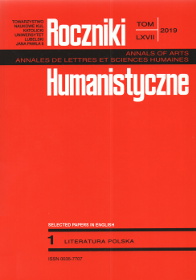Polish Literature in Israel: Between the Memory of Europe and a New Life
Abstract
The Polish version of the article was published in Roczniki Humanistyczne vol. 64, issue 1 (2016).
The article presents Polish literature in Israel as literature written by migrants: a response to the experience of being relocated and of functioning between different cultures. The subject of the analyses are the paraphrases, travesties and parodies of works by Adam Mickiewicz that are present in Polish-Israeli literature. Referring to the canon texts of Polish literature in them serves the recording of life in Israel. Using Polish literary patterns in stories about the new life and inscribing the Israeli world, as well as signs of Hebrew culture, into them is interpreted as a peculiar correlate of the experience of migration.
References
Assmann, Aleida. “Przestrzenie pamięci. Formy i przemiany pamięci kulturowej” (Erinnerungsräume: Formen und Wandlungen des kulturellen Gedächtnisses). In Pamięć zbiorowa i kulturowa. Współczesna perspektywa niemiecka (Collective and Cultural Memory. A Contemporary German Perspective), ed. Magdalena Saryusz-Wolska. Kraków: Towarzystwo Autorów i Wydawców Prac Naukowych “Universitas,” 2009.
Balbus, Stanisław. Między stylami (Between the Styles). Kraków: Universitas, 1996.
Eldar, Ruth. Wstrząsnąć filarami świątyni (To Shake the Pillars of the Temple). Łódź: Młyn—Literackie Studio Wydawnicze, 2004.
Famulska-Ciesielska, Karolina, Sławomir J. Żurek. Literatura polska w Izraelu. Leksykon (Polish Literature in Israel. A Lexicon). Kraków–Budapest: Austeria, 2012.
Famulska-Ciesielska, Karolina. “Miejsce twórczości i postaci Juliana Tuwima w literaturze polskiej w Izraelu.” In Żydowskie konteksty twórczości Juliana Tuwima (Jewish Contexts in Julian Tuwim’s Poetry), ed. Monika Adamczyk-Garbowska. Lublin: Wydawnictwo UMCS, 2015.
Famulska-Ciesielska, Karolina. Polacy, Żydzi, Izraelczycy. Tożsamość w literaturze polskiej w Izraelu (Poles, Jews, Israelis. Identity in Polish Literature in Israel). Toruń: Wydawnictwo Naukowe UMK, 2008.
Gliksman, Łucja. Wiersze zebrane (Collected Poems). Tel Aviv: Kontury, 2004.
Głowiński, Michał. Intertekstualność, groteska, parabola (Intertextuality, Grotesque, Parable). Kraków: Universitas, 2000.
Goldman, Marcel. A w nocy przychodzą myśli [And at Night Thoughts Come]. Kraków: Wydawnictwo Signo, 2012.
Gross, Natan. Co nam zostało z tych lat (What Is Left of Those Years). Tel Aviv, 1971.
Hemar, Marian. “Parafraza” (A Paraphrase). In Izrael w poezji polskiej. Antologia (Israel in Polish Poetry. An Anthology), selected and edited by Jan Winczakiewicz. Paris: Instytut Literacki, 1958.
Hemar, Marian. Liryki. Satyry. Fraszki, (Lyrical Poems. Satires. Epigrams). London, 1988.
Iwasiów, Inga. “Hipoteza literatury neo-post-osiedleńczej” (A Hypothesis of Neo-Post-Settler Literature). In Narracje migracyjne w literaturze polskiej XX I XXI wieku (Migration Narrations in Polish Literature of the 20th and 21st Centuries), ed. Hanna Gosk. Kraków: Towarzystwo Autorów i Wydawców Prac Naukowych “Universitas,” 2012.
Iwasiów, Inga. Rewindykacje. Kobieta czytająca dzisiaj (Regaining. A Reading Woman Today). Kraków: Towarzystwo Autorów i Wydawców Prac Naukowych Universitas, 2002.
Kołodziejczyk, Dorota. “Meta-fory, trans-lacje, hybrydy—tropy migracji” (Meta-phors, Trans-lations, Hybrids—the Tropes of Migration). In Narracje migracyjne w literaturze polskiej XX i XXI wieku (Migrant Narratives in Polish Literature of the 20th and 21st Century), ed. Hanna Gosk. Kraków: Towarzystwo Autorów i Wydawców Prac Naukowych “Universitas,” 2012.
Leociak, Jacek. “Na obu brzegach” (On Both Banks). Nowe Książki no 3 (1994).
Löw, Ryszard. “Wielka przygoda polszczyzny” (The Polish Language’s Great Adventure). In Maria Lewińska. Przechowane słowa (The Preserved Words). Tel Aviv: Instytut Polski w Tel Awiwie, 2008.
Molisak, Alina. “Narracje o wygnaniu w literaturze polskiej w Izraelu po roku 1948” (Narrations About Exile in Polish Literature in Israel After 1948). In Pisarz na emigracji: mitologie, style, strategie przetrwania (A Writer in Exile: Mythologies, Styles, Survival Strategies), eds. Hanna Gosk, Andrzej St. Kowalczyk. Warsaw: Elipsa, 2005.
Rit, Henryk [H. Ritterman]. Pan Tuwia i inne parafrazy literackie. Fraszki—humoreski—felietony (Mr Tuwia and Other Literary Paraphrases. Epigrams—Humorous Sketches—Feuilletons). Tel Aviv: “Hadfus Haklali,” 1951.
Szymel, Maurycy. “Jankiel Cymbalista” (Jankiel the Cymbalist). In Międzywojenna poezja polsko-żydowska. Antologia (Interwar Polish-Jewish Poetry. An Anthology), selected, provided with explanations and an introduction, and edited by Eugenia Prokop-Janiec. Kraków: Towarzystwo Autorów i Wydawców Prac Naukowych “Universitas,” 1996.
Venuti, Lawrence. Scandals of Translations. Towards the Ethics of Difference. London: Routledge, 1998.
Witkowska, Alina. “‘Pan Tadeusz’ emigracją naznaczony” (Pan Tadeusz Marked with Exile). In Trzynaście arcydzieł emigracyjnych (Thirteen Emigration Masterpieces), ed. Elżbieta Kiślak, Marek Gumkowski. Warsaw: Instytut Badań Literackich, 1996.
Żygulski, Kazimierz. Wspólnota śmiechu. Studium socjologiczne komizmu (The Community of Laughter. A Sociological Study of Humor). Warsaw: Państwowy Instytut Wydawniczy, 1985.
Copyright (c) 2019 Roczniki Humanistyczne

This work is licensed under a Creative Commons Attribution-NonCommercial-NoDerivatives 4.0 International License.





